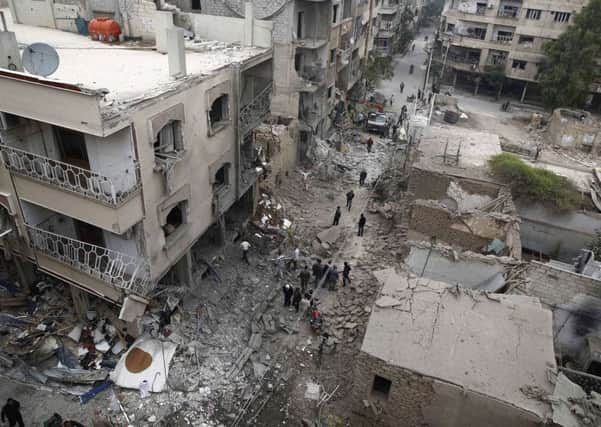Leaders: UK right to be cautious over Syria


Hopefully the findings will serve as a warning to David Cameron and rein in any blinkered desire to charge in and repeat the devastating mistakes of Tony Blair in Iraq.
More than a decade on, the Iraq war remains a divisive issue, although the balance of the divide has shifted. The “weapons of mass destruction” sham that was used to justify the 2003 invasion is one of the biggest intelligence failings we have ever known.
Advertisement
Hide AdAdvertisement
Hide AdThe episode now defines Tony Blair’s reputation, with the former prime minister having been accused of being a war criminal. He is still now being called to account for his decision to ignore advice from his own MPs and join George Bush’s rampage against Saddam Hussein.
Only last week he tried to say he was sorry, admitting there were “elements of truth” to the view that the invasion has contributed to the current problems in the region, helping to promote the rise of Islamic State militants.
Investigations have revealed that much of the key “evidence” used to justify going in was based on fabrication, wishful thinking and lies.
“I apologise for the fact the intelligence we received was wrong,” said Blair.
Wrong? It was horrendously and tragically wrong, resulting in hundreds of thousands of deaths – including 179 UK military personnel.
Politicians in his ranks who spoke out against the prime minister were often discredited, or found their career ambitions turned to dust. They were the brave ones. They were the wise ones. However, even they could not stop the folly that was to unfold in the Middle East.
Too many in the British forces lost their lives on the back of a false premise. We cannot and must not make that mistake again. Military action has desperate consequences for all involved and should always be the last resort.
The case for attack must be irrefutable before going in to Syria, all guns blazing.
Advertisement
Hide AdAdvertisement
Hide AdSo while not playing down the “humanitarian and security catastrophe” that is currently playing out in Syria, the select committee is absolutely right to recommend a “coherent international strategy” is put in place before backing any proposal to step up the UK’s part in the conflict.
Without a clear, long-term vision aimed at bringing about lasting stability in the region, scaling up the military offensive will achieve nothing. It is also unlikely that any single country could solve the problem on its own, with a series of uncoordinated unilateral attacks proving ineffectual overall.
The way forward must be through a strong, united action plan that satisfies “political, legal and military risks”. Ultimately, peace will only come through resolution of issues driving the broader civil war in the region.
The biggest irony in all of this must surely be the fact that the committee is Tory-led. Once again, after defeat in the Lords over tax credits, we have the government being called to account by its own.
But it’s time to stop blaming the messenger. The time has come to listen, very carefully.
Health of nurses is a weighty issue
We are all aware of the obesity epidemic facing society today. But though it is a fairly new challenge for human health in the developed world, it is also one of the most worrying.
It is easy to presume the problem is largely confined to certain sectors of society, though in fact it is widespread. Recent official figures show the crisis could be costing up to £4.6 billion a year in treatment costs and lost productivity in Scotland alone, with the global economic impact estimated at £1.3 trillion.
International studies carried out in recent years have seen Scotland dubbed the “fat man of Europe”, with the second-highest obesity rates in the world after the US. But still it seems shocking that studies show obesity rates are higher among Scottish nurses than their UK and US counterparts as well as the wider Scottish population. It is tempting to believe working in healthcare might see the opposite effect. But these new findings should not come as a surprise – after all, many doctors continue to smoke.
Advertisement
Hide AdAdvertisement
Hide AdNurses are just as susceptible to the causes of obesity as the rest of us – probably more so. The main factor is a lifestyle dictated by their profession. Nursing can be stressful and requires individuals to work long and antisocial hours. This makes it much harder to opt for a healthy diet over convenience food and often rules out taking proper exercise.
We should support the call for health boards to provide better catering for staff on long or overnight shifts. Yes, it would come at a cost, but it would be an investment in staff and therefore in the provision of effective services.
There has to be recognition that what we demand of our front-line medical staff cannot be fuelled by the sort of high-calorie fare that comes out of a vending machine.